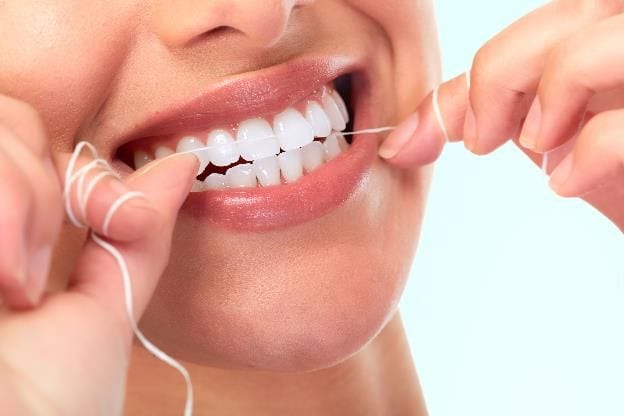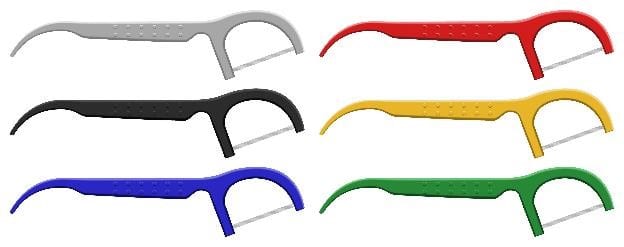
You have probably heard that daily flossing is essential to good oral health, but did you know that different kinds of floss have different benefits? That’s right. The type of floss or flosser you use can impact the health of your teeth and gums.
Below, we’re going to talk about different types of floss and flossers you can use and weigh their benefits and drawbacks, but first let’s start with the basics: why it’s important for you to floss every day.
Essentially, flossing cleans out the tiny food particles between your teeth that brushing alone can’t remove, no matter how thoroughly you brush. If those tiny particles sink underneath your gums, they can cause periodontal disease and further complications like heart disease and stroke. That’s why it’s so important to choose the floss that’s best for you and which will encourage you to use it every day.
Is this really a problem? Absolutely. According to a study conducted by the American Dental Association, about 50% of Americans floss every day, and 10% of Americans never floss. Clearly, many of us need to improve our flossing habits, and knowing the differences between the kinds of flosses that are out there can help you choose the best one for you.
Picking the Right Floss for You
Nylon floss. The most commonly available type of floss is nylon floss. You can purchase this floss with wax or without wax. The waxed floss may glide more easily between your teeth, but that’s really the biggest difference between waxed and unwaxed. Nylon floss also comes in a variety of flavors, or you can get it unflavored.
The upside to nylon floss is its affordability and ease of use. The downside is that nylon floss can fray or break, depending on the pressure you use and the spacing of your teeth.
Monofilament floss. Similar to nylon floss in terms of price and method of use, it also comes with or without wax, as well as in flavored or unflavored varieties. Since it is made of a single thread of plastic rather than multiple threads like nylon, it doesn’t break as easily. Some people find that it is easier to use than nylon floss because it slides more smoothly between their teeth.
Both nylon and monofilament flosses come in different thicknesses. If you use either of these flosses, choose whichever thickness is most comfortable for you.

Disposable floss picks. These are a popular, inexpensive choice that may help people who have difficulty manipulating nylon or monofilament floss. However, there are two things to keep in mind with this kind of floss. Because you are using one short piece of floss for your entire mouth, you run the risk of transporting infection from one area to all others in your mouth. Also, these picks are environmentally unfriendly as compared to the other choices.
Dental tape. This is a wider weave of nylon that is flat and thin, and may be easier for some people to use than standard floss, so sometimes it’s used as a starter floss. It also comes waxed or unwaxed. Choose according to your preference.
Electric flossers. These work by shooting a concentrated stream of water through the spaces in between teeth. Several studies show that electric flossers are just as safe and effective as traditional floss.
An electric flosser is the most expensive option, but it can also be the most practical solution. Older adults may find electric flossers easier to use than traditional floss. Children and teenagers may floss more often if they think the electric flosser is fun to use. Electric flossers are also good for people with orthodontic appliances. Some people use an electric flosser at home and standard floss when traveling.
If you do have orthodontic appliances, you may need extra help getting the floss in between spaces. Products like floss threaders can guide floss between teeth, using a needle-like device. You may also like Super Floss, which has stiff ends so you can work around your braces or bridges.
When it comes to choosing the best floss for you, know that no single method outperforms another. In a recent study published by the Journal of Periodontology, no difference was shown in the effectiveness of removing plaque among monofilament floss, nylon floss, unwaxed floss, and an electric flosser. All four methods were effective at removing plaque, so any of these methods can work well.
The bottom line is that the best floss for you is the one that you will use consistently. If you only brush daily and do not floss, you’re only doing half the work in taking care of your oral health, and you put yourself at risk for greater health problems in the future.
Choose a floss that helps you get the job done every single day, and your oral health will greatly improve. You’ll feel good about taking better care of yourself too.
Contact us today to learn more about good habits for oral health and to schedule a cleaning and checkup.






